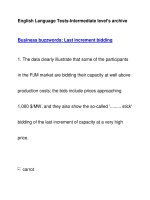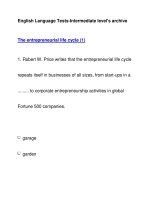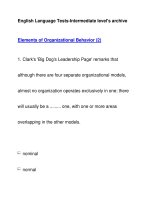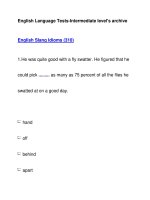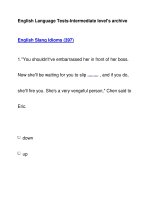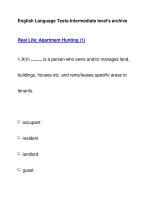English Language Tests-Intermediate level''''s archiveElements of Organizational Behavior (1) potx
Bạn đang xem bản rút gọn của tài liệu. Xem và tải ngay bản đầy đủ của tài liệu tại đây (76.15 KB, 9 trang )
English Language Tests-Intermediate level's archive
Elements of Organizational Behavior (1)
1. Donald R. Clark explains that the organization's base
on management's philosophy, values, vision and
goals.
reclines
rests
sets
sits
2. This in turn the organizational culture, which is
composed of the formal organization, informal
organization, and the social environment.
drives
forces
leads
whips
3. The culture determines the type of leadership,
communication, and group within the organization.
dynamics
kinetics
physics
psychics
4. The workers perceive this as the quality of work life
which directs their degree of motivation, and the final
outcomes are performance, individual , and personal
growth and development.
salutation
satiation
satisfaction
saturation
5. In the autocratic organizational model, the basis is
power with a managerial orientation of authority, while the
employees are oriented towards and dependence
on the boss.
obduracy
obedience
obeisance
observance
6. The employee need that is met is subsistence, and the
performance result is
median
menial
minimal
modest
7. In the custodial organizational model, the basis is
economic resources with a managerial orientation of
, while the employees are oriented towards security
and benefits and dependence on the organization.
finances
funds
money
wages
8. The employee need that is met is security, and the
performance result is cooperation.
passive
pensive
penurious
persuasive
9. In the supportive organizational model, the basis is
leadership with a managerial orientation of , while
the employees are oriented towards job performance and
participation.
success
succession
support
supposition
10. In the collegial organizational model, the basis is
partnership with a managerial orientation of teamwork,
while the employees are oriented towards responsible
behavior and
self-awareness
self-consciousness
self-control
self-discipline
